Real estate and property management involve more than just selling homes or collecting rent. For developers, brokers, and agencies in India, it’s a structured process where every role contributes to the bigger goal, running smooth operations and delivering a great experience to clients. But who does what? And how do these roles work together to manage properties efficiently while keeping business goals on track?
If you're managing a growing portfolio or leading a real estate team, knowing these duties helps you set clear expectations, avoid confusion, and boost overall productivity. In this article, you’ll get a deeper look at key responsibilities across the board, from sales to site supervisors, so you can manage smarter and scale faster.
Overview of Roles in Property Management
Before you hire a team or choose a CRM to support your operations, it’s important to understand what property management really involves. If you were to define real estate management in practical terms, it's the day-to-day oversight of residential, commercial, or industrial properties on behalf of the owner. This includes handling tenant relations, maintenance, rent collection, legal compliance, and budgeting—essentially, everything that keeps a property running smoothly and profitably.
Many people confuse property management with real estate asset management, but the two are not the same. While property management focuses on operations, asset management is more financial in nature. Asset managers look at long-term investment goals, property valuations, ROI, and strategies to grow the portfolio’s overall value. In simple words, one keeps the engine running, the other plans where the car should go.
Understanding real estate management in this context helps real estate developers and brokers assign the right responsibilities, reduce overlap, and improve team efficiency.
Recommended: Managing and Organizing Inventory in Real Estate.
Key Roles in Real Estate Property Management
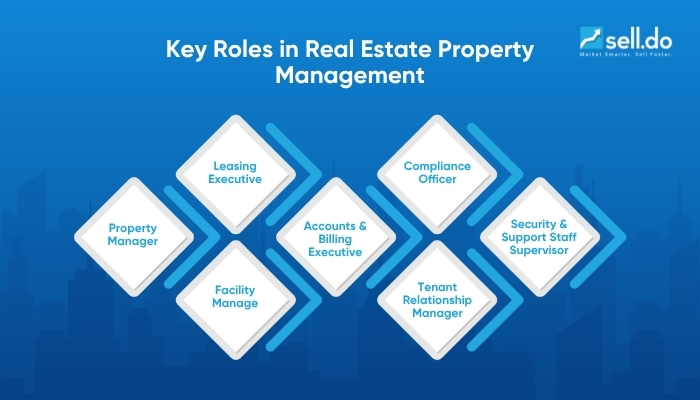
Each role in the team contributes to how well a property is run, how happy the tenants are, and how smoothly issues are handled. Here are the key roles typically involved in managing residential or commercial properties in India:
- Property Manager: This is the central figure in property management. They oversee the overall functioning of the property—rent collection, issue resolution, compliance, and communication with tenants and owners. In India, they often coordinate with local authorities and housing societies for water, electricity, and civic services.
- Leasing Executive: Focused on filling vacant units, leasing executives handle property listings, respond to inquiries, arrange site visits, and finalize rental agreements. They also make sure that the documents are legally sound and compliant with Indian lease norms, including handling stamp duty and registration requirements where needed.
- Facility Manager: Responsible for the building’s physical upkeep. This includes managing lift maintenance, housekeeping, generator services, fire safety systems, and vendor contracts. In gated communities or office complexes, this role ensures everything works like clockwork—from landscaping to waste management.
- Accounts and Billing Executive: Keeps track of all financial activity related to the property. This includes rent payments, society maintenance charges, property tax payments, vendor bills, and owner payouts. They also handle invoicing and provide monthly financial reports.
- Legal and Compliance Officer: Ensures that all agreements, notices, and operations follow local laws. This role includes drafting or reviewing lease agreements, handling eviction notices, ensuring RERA compliance (if applicable), and managing paperwork for municipal or property-related approvals.
- Tenant Relationship Manager: Builds and maintains positive relationships with tenants. They handle onboarding, issue escalation, feedback, and renewal processes. In residential settings, they may also coordinate with society management and organize community activities.
- Security & Support Staff Supervisor: Oversees the staff responsible for day-to-day services like security, cleaning, plumbing, and electrical work. This role ensures timely response to service requests and proper scheduling of shifts and duties across multiple support functions.
While roles define who is responsible, the core duties highlight what actually needs to be done to keep property operations running smoothly.
You can also check our blog: Steps to Become a Successful Real Estate Agent: Tips for Success.
Core Duties in Property Management Operations
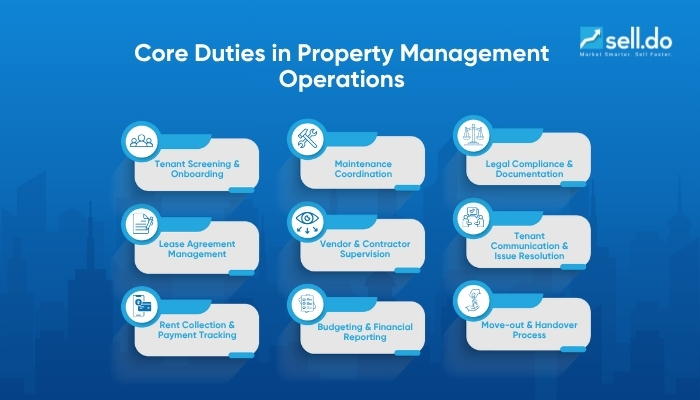
Once the right team is in place, the next step is execution. Here are the core duties involved in real estate and property management:
- Tenant Screening and Onboarding: Before a tenant moves in, background checks are essential. This includes verifying employment, checking rental history, and reviewing ID/address proof. In India, many property managers also consult local police verification procedures, especially for long-term residential tenants.
- Lease Agreement Management: Drafting and executing lease agreements that align with local laws, including stamp duty payment, proper documentation, and, when required, registration of the lease with sub-registrar offices. This protects both the landlord and the tenant legally.
- Rent Collection and Payment Tracking: Collecting rent on time, issuing receipts, and maintaining clear records of all financial transactions. Automated reminders and digital payment options are now commonly used in Indian metro cities to simplify this process and reduce follow-ups.
- Maintenance Coordination: From plumbing issues to electrical faults, timely response to repair and maintenance requests is a key duty. Managers also schedule routine servicing for lifts, generators, and water tanks, especially important in high-rise buildings and gated communities.
- Vendor and Contractor Supervision: Coordinating with local vendors for cleaning, pest control, security services, and landscaping. Property managers are responsible for negotiating rates, tracking service quality, and managing AMC contracts where applicable.
- Budgeting and Financial Reporting: Preparing expense reports, managing service charges, planning maintenance budgets, and submitting monthly or quarterly financial summaries to owners. Transparency is vital here, especially for NRIs or investors with multiple properties.
- Legal Compliance and Documentation: Ensuring that property tax, society dues, and other statutory payments are made on time. Managers also keep track of compliance with building norms, fire safety, and, in some cases, RERA guidelines, depending on the project’s status.
- Tenant Communication and Issue Resolution: Handling complaints, sending important notices, and ensuring timely resolution of issues—whether related to maintenance, billing, or society policies. Clear communication builds trust and improves tenant retention.
- Move-out and Handover Process: When a tenant vacates, the property manager handles the inspection, collects keys, checks for damages, and initiates the refund process. This step also includes preparing the unit for the next tenant—repainting, cleaning, and repairing if needed.
These duties form the foundation of reliable, long-term real estate and property management. When done well, it not only ensures smooth day-to-day operations but also strengthens your brand as a professional and trustworthy property manager.
Also Read: Understanding How Commercial Real Estate Brokers Get Paid in Commission.
Challenges in Property Management
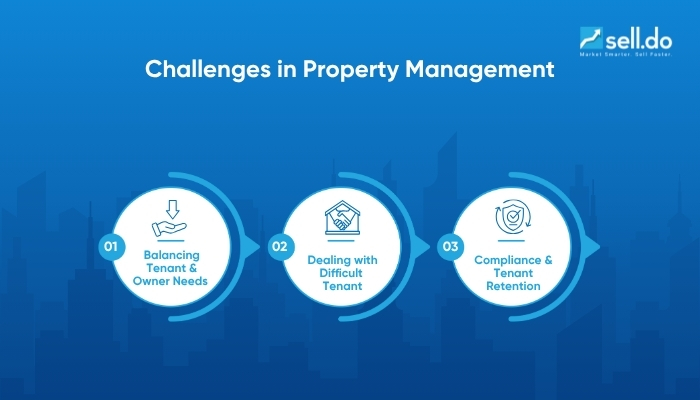
Managing properties in India comes with its share of practical difficulties. Here are some of the common challenges property managers need to tackle:
- Balancing Tenant and Owner Needs with Regulations: Owners want returns, tenants want comfort, and laws require compliance. Meeting all three can be tricky, especially when rental expectations, maintenance budgets, and legal timelines don’t align.
- Dealing with Difficult Tenants: Late payments, property misuse, or repeated complaints can disrupt operations. Managers must remain calm, professional, and legally sound while resolving conflicts without affecting other tenants or the property's reputation.
- Ensuring Compliance and Tenant Retention: From lease documentation to society rules and RERA updates, staying compliant is non-negotiable. At the same time, providing consistent service and prompt support is key to keeping good tenants long-term.
While these challenges are part of day-to-day property management, streamlining other critical areas like communication, documentation, and tracking can make a big difference. That’s where a tool built specifically for real estate, like Sell.Do can help.
Also, check our blog: Top Strategies to Improve Real Estate Sales for Indian Channel Partners.
Implement Sell.Do for Real Estate and Property Management
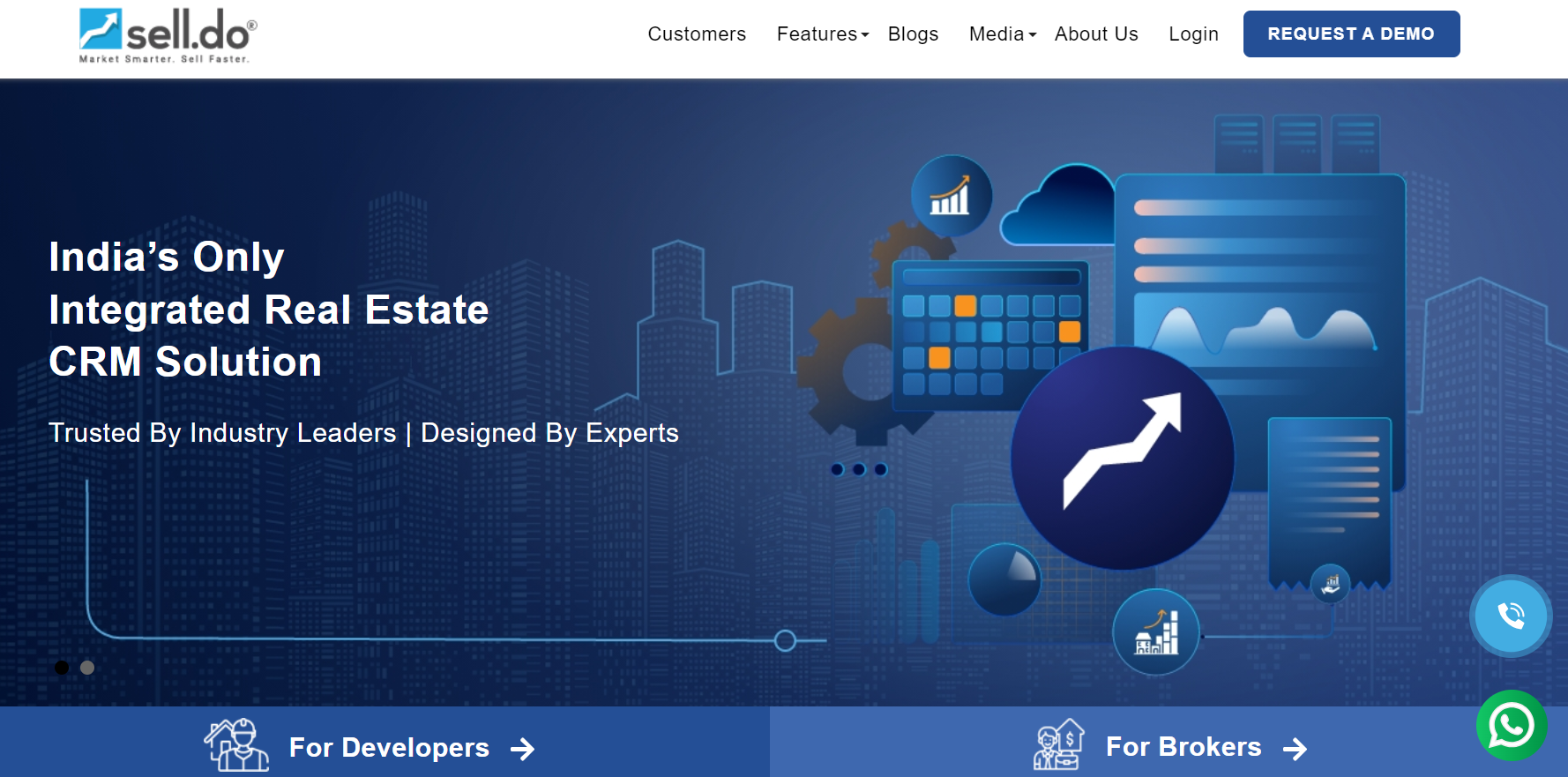
Sell.Do is India’s only end-to-end CRM solution built exclusively for the real estate industry. Designed to handle the unique challenges of developers, brokers, and property managers, it offers a powerful suite of tools that streamline sales, marketing, and customer engagement—all in one platform.
With over a decade of experience and 1,000+ real estate developers across 26 cities in India and 3 countries trusting Sell.Do, it has become the preferred CRM choice for the industry. Sell.Do brings the stability of an enterprise platform with the flexibility of a modern SaaS product.
Key Features of Sell.do
- Centralized Customer and Booking Management: Sell.Do provides a unified platform to manage customer interactions and bookings, ensuring seamless communication and efficient handling of client information.
- Inventory and Stage Management: The CRM allows for detailed inventory tracking across projects, towers, and units, enabling property managers to monitor sales stages and prioritize leads effectively.
- Cost Sheet and Payment Schedule Management: Sell.Do facilitates the creation and management of cost sheets and payment schedules, providing transparency and ease in client financial transactions.
- Automated Communication: With integrated email, SMS, and call functionalities, property managers can automate communication for tasks such as sending demand letters, payment reminders, and updates, enhancing client engagement.
- Document Management: The platform offers secure storage and easy access to essential documents, including lease agreements and payment receipts, ensuring organized record-keeping and compliance.
- Omnichannel Communication: Sell.Do supports communication across various channels like calls, emails, WhatsApp, and SMS, allowing property managers to connect with clients through their preferred mediums.
- Sales Automation: The CRM automates sales workflows, including lead assignments and approval processes, reducing manual tasks and improving operational efficiency.
- Marketing Analytics: Sell.Do provides detailed analytics to optimize marketing campaigns, helping property managers make informed decisions and improve ROI.
By leveraging these features, Sell.Do empowers property managers to handle complex tasks efficiently, maintain compliance, and enhance tenant satisfaction, ultimately contributing to the success of real estate operations.
Recommended: Real Estate Newsletter Ideas and Examples for 2025.
Final Thoughts
Real estate and property management goes beyond maintenance and rent collection. It’s about clearly defined roles, consistent execution, legal compliance, and strong tenant-owner relationships. Done right, it brings stability and long-term value.
To make this process easier, Sell.Do offers a real estate CRM built specifically for your needs. From tenant communication to document tracking and financial oversight, Sell.Do helps you manage operations seamlessly, all in one platform. Get started with Sell.Do today to simplify your real estate business and property management.
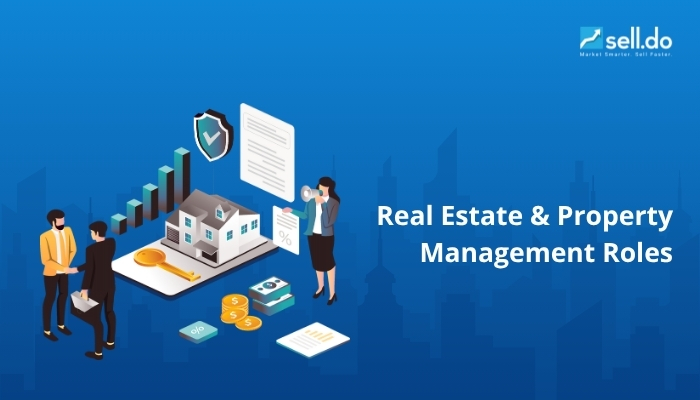


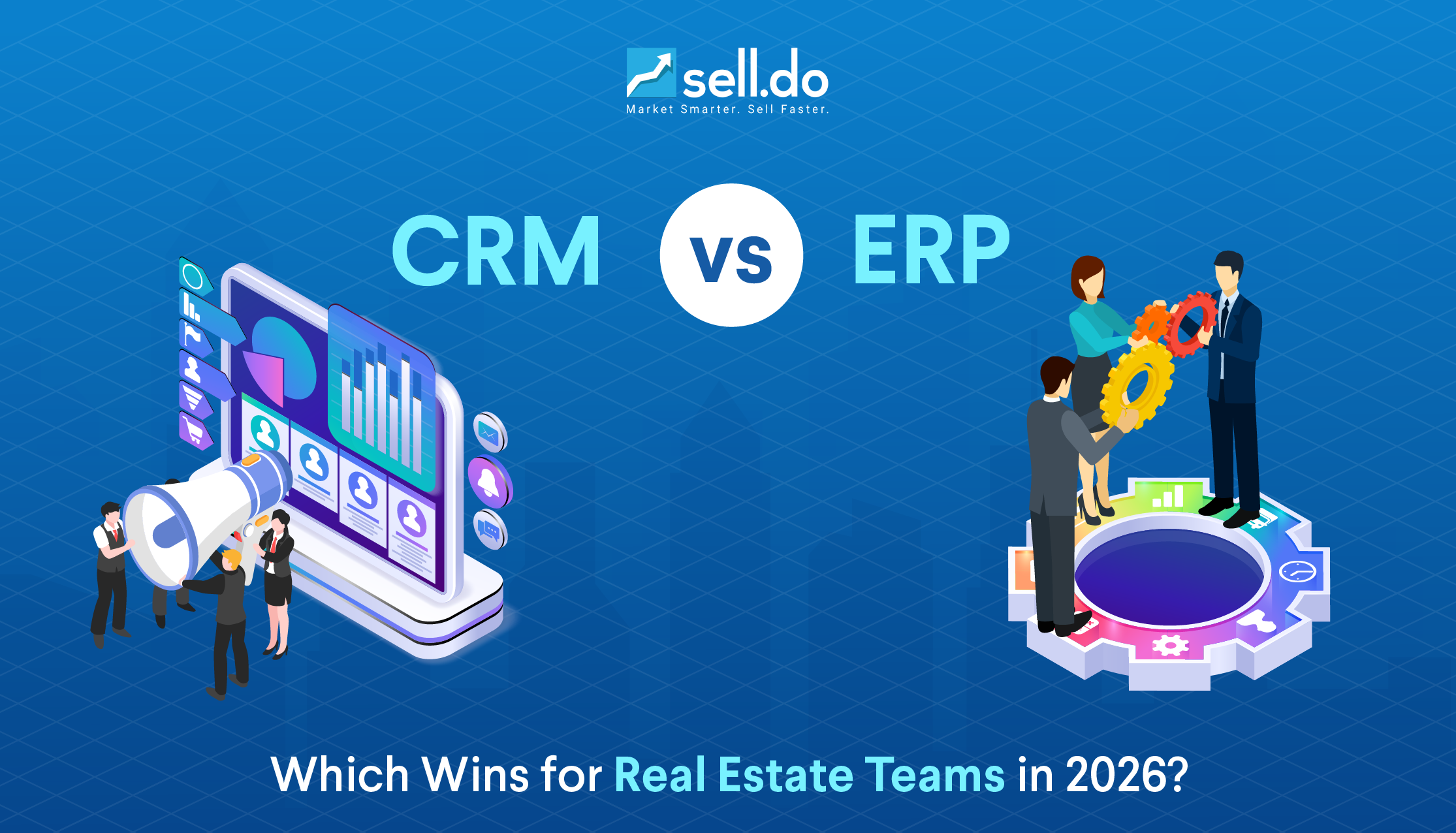

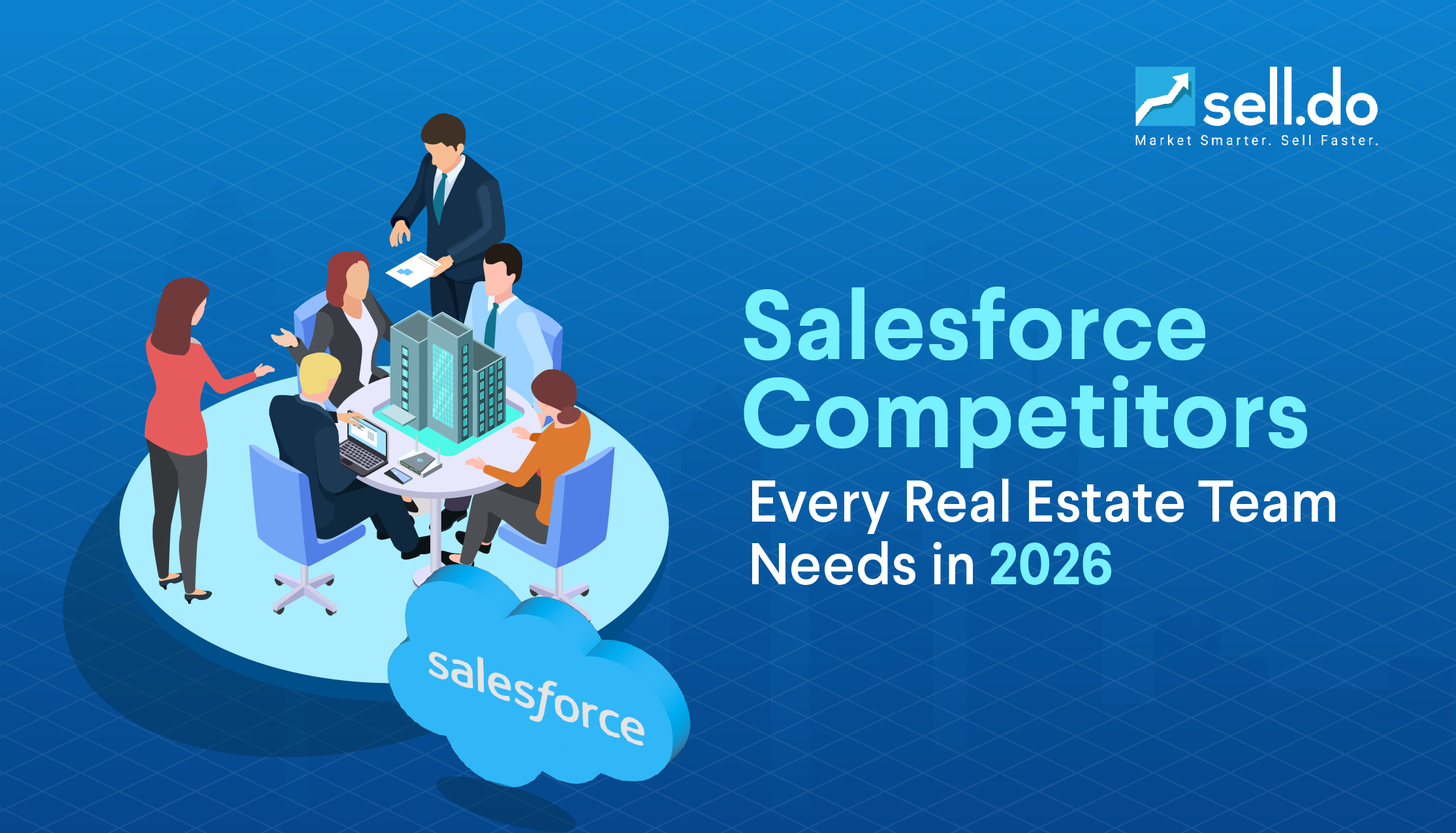
Leave a comment
Comments (0)
Be the first one to comment.